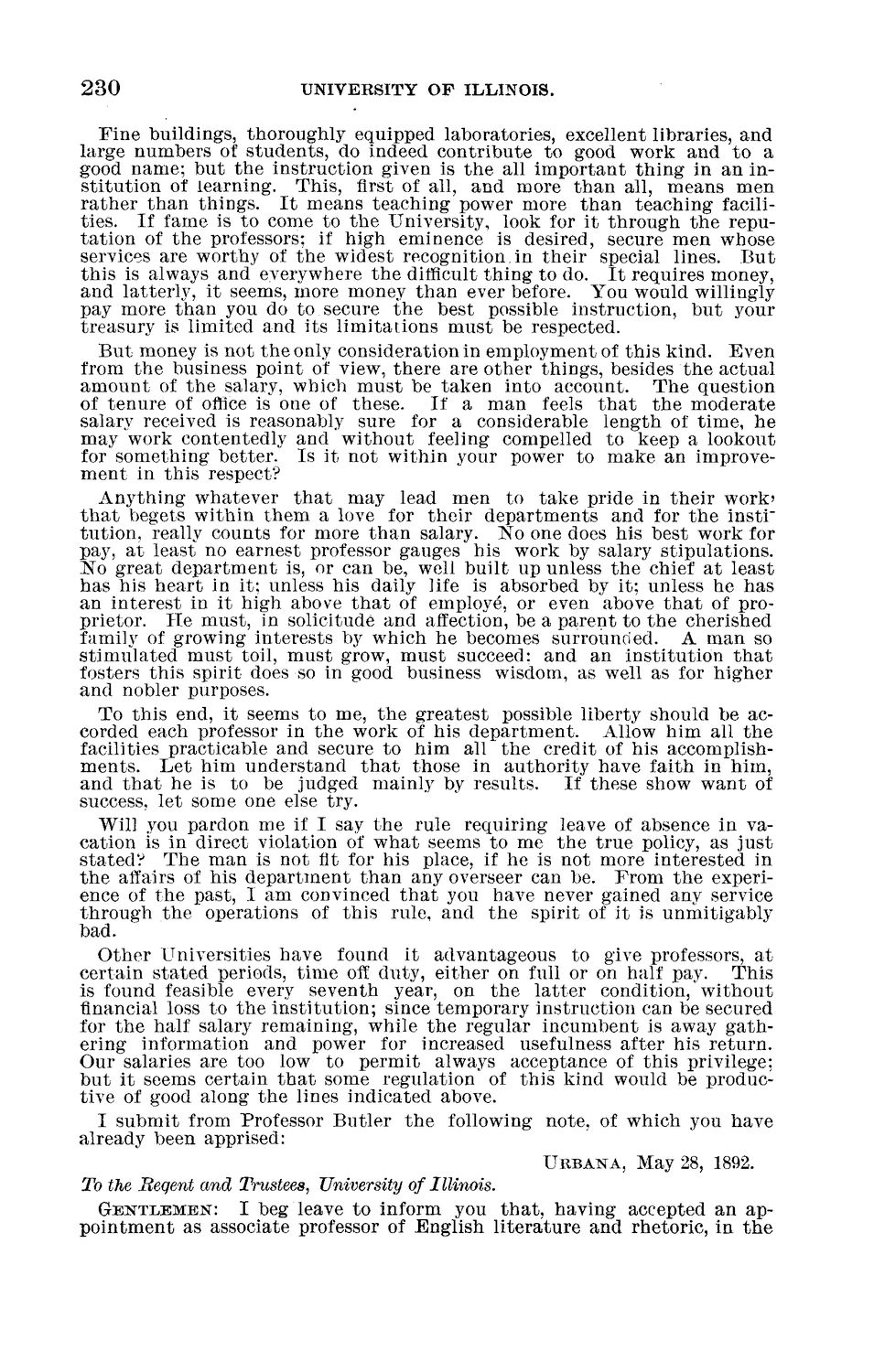| |
| |
Caption: Board of Trustees Minutes - 1892
This is a reduced-resolution page image for fast online browsing.

EXTRACTED TEXT FROM PAGE:
230 UNIVERSITY OF ILLINOIS. Fine buildings, thoroughly equipped laboratories, excellent libraries, and large numbers of students, do indeed contribute to good work and to a good name; but the instruction given is the all important thing in an institution of learning. This, first of all, and more than all, means men rather than things. I t means teaching power more than teaching facilities. If fame is to come to the University, look for it through the reputation of the professors; if high eminence is desired, secure men whose services are worthy of the widest recognition.in their special lines. But this is always and everywhere the difficult thing to do. I t requires money, and latterly, it seems, more money than ever before. You would willingly pay more than you do to secure the best possible instruction, but your treasury is limited and its limitations must be respected. But money is not the only consideration in employment of this kind. Even from the business point of view, there are other things, besides the actual amount of the salary, which must be taken into account. The question of tenure of office is one of these. If a man feels t h a t the moderate salary received is reasonably sure for a considerable length of time, he may work contentedly and without feeling compelled to keep a lookout for something better. Is it not within your power to make an improvement in this respect? Anything whatever t h a t may lead men to take pride in their work' t h a t begets within them a love for their departments and for the insti" tution, really counts for more than salary. No one does his best work for pay, at least no earnest professor gauges his work by salary stipulations. No great department is, or can be, well built up unless the chief at least has his heart in it; unless his daily life is absorbed by it; unless he has an interest in it high above t h a t of employe, or even above t h a t of proprietor. He must, in solicitude and affection, be a parent to the cherished family of growing interests by which he becomes surrounded. A man so stimulated must toil, must grow, must succeed: and an institution t h a t fosters this spirit does so in good business wisdom, as well as for higher and nobler purposes. To this end, it seems to me, the greatest possible liberty should be accorded each professor in the work of his department. Allow him all the facilities practicable and secure to him all the credit of his accomplishments. Let him understand t h a t those in authority have faith in him, and t h a t he is to be judged mainly by results. If these show want of success, let some one else try. Will you pardon me if I say the rule requiring leave of absence in vacation is in direct violation of what seems to me the true policy, as just stated? The man is not fit for his place, if he is not more interested in the affairs of his department than any overseer can be. Erom the experience of the past, I am convinced t h a t you have never gained any service through the operations of this rule, and the spirit of it is unmitigably bad. Other L T niversities have found it advantageous to give professors, at certain stated periods, time off duty, either on full or on half pay. This is found feasible every seventh year, on the latter condition, without financial loss to the institution; since temporary instruction can be secured for the half salary remaining, while the regular incumbent is away gathering information and power for increased usefulness after his return. Our salaries are too low to permit always acceptance of this privilege; but it seems certain t h a t some regulation of this kind would be productive of good along the lines indicated above. I submit from Professor Butler the following note, of which you have already been apprised: U R B A N A , May 28, 1892. To the Regent and Trustees, University of Illinois. GENTLEMEN: I beg leave to inform you that, having accepted an appointment as associate professor of English literature and rhetoric, in t h e
| |